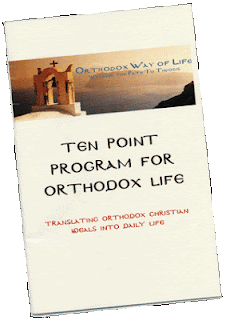Max Weber wrote in his well-known study on Capitalism and Protestant ethics, "one does not work to live; one lives to work." So, what is it we live for? Based on our busy lives it could be either of these. There are some like Aristotle who would say we work so we can enjoy leisure. His idea of leisure was contemplation, not a trip to the lake or any such activity. But does this fit the reality of our lives?
As an Orthodox Christian we say we live to be united with God, to be joined with Him in eternal life. Our aim is to transcend this life, to conquer death, to live in faith, following the path of Jesus Christ.
So, what is our "work"? Is it not to acquire a deep faith so that we live without fear of death or sickness? Is it not to gain knowledge of the mystical truths about our existence? Our work, no matter what our occupation is to learn from the events of our daily life the Truth about our Creator and His expectations for us. This knowledge eventually transcends intellectual knowledge to an experiential knowledge based on a personal relationship with God.
Does this come easily without effort? Of course not. Knowing God is hard work. What is the nature of this work? What did Jesus tell us? He said there are only two laws: love God with our whole heart and love our neighbor as we love ourselves. The second flows from the first and the first is reinforced by the second. So our work then must be to love. But what does this mean?
It has nothing to do with earning a living. This is a common struggle all humans face. It's simply the nature of life, to work to live. The error we can make is to think we live to work, to earn money for our livelihood and leisure.
The true work of a Christian is something more than what we do to survive or gain leisure. It is a spiritual calling to learn to rely on God in all we do, to become aware of His presence at all time and in all things. Our true leisure come when in quietness we can contemplate God. This does not come from our efforts to do our jobs well. It is not dependent on how many hours we work. It is not a function of our financial success. It is not even the result of simply being good parents our outstanding citizens.
God was made incarnate to show us the nature of the work we are called to do. His coming and taking of flesh of a virgin showed us the image we were created with, flesh united with the divine. He taught and then through His voluntary death on the Cross showed us that there is life beyond this utilitarian life on earth. All we have to do is to believe in Him and follow his example. His coming was the peak of God's creation, the perfection of mankind.
After His death and Resurrection he ascended into heaven and then sent the Holy Spirit empowering His followers to establish the Church. The Church is where we now all can go to become like Him, uniting our flesh with the divine. Through the Church we have the Sacraments, we have the Scripture, we have the necessary ascetic practices such as prayer and fasting, we have the hymns and iconography and the writings of the holy people of the Church to guide us.
All this leads to what we call the Orthodox way of Life. here are the ten elements of such a life that is applicable to all Christians no matter what their occupation may be.
1. Have a regular prayer rule that includes morning and evening prayer.
2. Worshiping and Participating in Sacraments. Attend and participate in the Divine Liturgy receiving Holy Communion regularly as well as regular participation in Confession.
3. Honoring the Liturgical Cycle of the Church. Follow the seasons of the church and participate in the fasts and feasts of the Church.4. Using the Jesus Prayer. Repeat the Holy name whenever possible throughout the day or night.5. Slowing Down and Ordering Your Life. Set priorities and reduce the stress and friction caused by a hurried life.6. Being Watchful. Give full attention to what you are doing at the moment.7. Taming the Passions. Overcome your habits, attachment to your likes and dislikes, and learn to practice the virtues.8. Putting Others First. Free yourself from your selfishness and find joy in helping others.9. Spiritual Fellowship. Spend time regularly with other Orthodox Christians for support and inspiration.10. Reading the Scriptures and Holy Fathers. Be inspired by the lessons of the Holy Scriptures, the wisdom of the Holy Fathers and the lives of the Saints of the ChurchFor more on this spiritual effort we are led to participate in read more about each of these then points in the booklet, Ten Point Program For Orthodox Life. You can download it free or ask for a free copy.

Very interesting article. How do I get a hard copy of this book?
ReplyDeleteSaabrina, just email me your address and I will send you one. cjoiner@mac.com
ReplyDelete